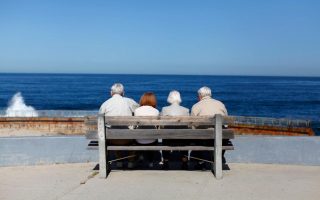Clinging on to traditional island life in the Cyclades

Kyriakos’ grandfather was a fisherman and lutist, like himself. His father is a fisherman and violinist, like Kyriakos’ son. For four generations fishing and music have been central to their lives, this has not changed. What has changed dramatically, however, is their home – an island in the Cyclades, and one of the most popular with tourists. So much so that even they themselves have difficulty recognizing it.
“Almost all the villages have been unified, you’ll hardly find a field that is not built on. At night, with the lights on, the image reminds you of Athens. There are vehicles everywhere: There are 5,000 vans and the same number of rental cars – the declared ones – not to mention the two-wheelers and the quad bikes,” Kyriakos informs Kathimerini.
The “road” they prefer is the sea. Their boat, Flora, is their second home. A few years ago they refused the European subsidy which led to the destruction of hundreds of traditional wooden fishing boats. “We couldn’t bear to break it apart,” Kyriakos confesses. But their nets can no longer provide a living for the family. “The fish are becoming less and less. Eight out of 10 of what we catch are exotic species – dusky spinefoot, blue-spotted cornetfish, lionfish. Consumers don’t know about them, so we can’t sell them.”
Fishing tourism gave them an outlet, an excuse not to turn their eyes and their lives toward the land. They organize excursions for foreigners or Greeks who want to see the traditional way of fishing up close. Flora, Kyriakos’ wife, makes kakavia (fisherman’s soup) with the small fish they catch, or fries bigger ones, while the men cut the salad, peel potatoes, set a table on the deck, fill the glasses with wine, play music and sing. “Everything that our guests will eat is from our nets and vegetable garden, nothing is bought, there’s no pretense. Essentially, we are showing them something that no longer exists and that, unfortunately, few Greeks value anymore, as they should – the connection with the sea and the land,” Captain Kyriakos tells me. “The argument of most locals is that times have changed. I don’t agree. People make the times – those who once lived on our island, those who live today, and those who will live in the future. Will they love it the same way? Will they respect it? Will they take care of it?” he wonders.
We raise our glasses filled with fresh Assyrtiko wine. We didn’t have an answer to that question.





